 klaus-michael schneider
klaus-michael schneider
Keywords: education |
Links: FOTW homepage | search | disclaimer and copyright | write us | mirrors

Last modified: 2021-08-26 by  klaus-michael schneider
klaus-michael schneider
Keywords: education |
Links: FOTW homepage |
search |
disclaimer and copyright |
write us |
mirrors
See also:
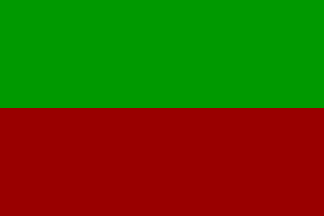 image by Ivan Sache, 27 September 2014
image by Ivan Sache, 27 September 2014
Institución Educativa Sebastián de Belalcázar is located in the Belalcázar
borough, part of the town of Medellín (Antioquia Department).
The institute was established by Resolution No. 9,301 of 22 December 1994. It
was originally a secondary seat of Liceo María Montessori, and, subsequently
(1982), of Liceo Tricentenario. The institute is named for the Spanish
conquistador Sebastián de Belalcázar / Benalcázar (1480-1551), appointed Captain
of Darién in 1514 and Mayor of León (Nicaragua) in 1524.
The flag of the institute, adopted in 1997, is presented in Chapter 1.2 of the
institute's Etiquette Guidebook, as horizontally divided green-wine red.
Green is a symbol of youth and exuberant vegetation. Wine red is a symbol of
knowledge.
Source:
http://master2000.net/recursos/fotos/62/GUÍA%20PARA%20LA%20CONVIVENCIA%20INSTITUCIONAL.pdf
- Institute's website
Ivan Sache, 27 September 2014
 image by Ivan Sache, 12 October 2018
image by Ivan Sache, 12 October 2018
Liceo Semillas par el Futuro (Seeds for Future) was established in 2007 in
Jamundí (Valle del Cauca Department) by María Norys Caicedo.
The flag of
Liceo Semillas par el Futuro is horizontally divided white-blue-gray.
White
is associated with light, kindness, innocence, purity and integrity. It is
considered as the color of perfection. White means security, purity and
limpidity of the children, who are characterized by their innocence and
identified by their spontaneity.
Blue is the color of the sky and the sea,
associated with stability and depth. It represents loyalty, confidence,
knowledge, intelligence,
faith, truth and the eternal sky. Blue is
considered as a good color both for the body and soil, producing a relaxing
effect. It is strongly
connected with tranquility and calm.
Gray produces
stability, inspires creativity and symbolizes achievement.
http://www.liceosemillas.edu.co/simbolos.html
School website
Ivan Sache, 12 October 2018
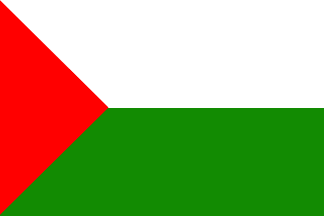 image by Ivan Sache, 15 June 2018
image by Ivan Sache, 15 June 2018
The Conciliar Seminary of Ipiales (Nariño Department), succeeding the old
Minor Seminary Nuestra Señora de Los Lajas, was blessed on 27 May 1971,
fulfilling a project initiated in 1966 by Bishop Alonso Arleaga Yepez
(1965-1985). Classes started on 8 September 1971.
The flag of IE Seminario is prescribed in Article 7 of the Manual de Convivencia
as in proportions 2:3, horizontally divided white-green with a red triangle
placed along the hoist and reaching one third of the flag.
The white stripe represents the quest for truth.
The red stripe represents vitality.
The green stripe represents hope.
Source:
Manual de Convivencia
Ivan Sache, 15 June 2018
 image by Ivan Sache, 3 January 2009
image by Ivan Sache, 3 January 2009
"Colegio Seminario Menor Diocesiano" is a Roman
Catolic institute ran by the Diocese of Chiquinquirá, Department
of Boyacá. The institute was founded by the first Bishop of
Chiquinquirá, His Grace Alberto Giraldo Jaramillo, on 1 November
1978 (Ecclesistic Decree No. 027). Classes started on 20 February
1979 and the institute was recognized by the Ministry of National
Education on 3 March 1982 (Decree No. 2099).
The flag of the institute, as shown on a photo and described on
the
website of the institute, is horizontally divided emerald
green-blue. Green represents the "vegetal velvet covering
the picturesque landscape surrounding the institute", the
green "God's gems" found in the underground of Western
Boyacá (that is, emeralds), and, most important, hope. Blue
symbolizes the Blessed Virgin, the patroness of the institute.
These two colours are also used in the coat of arms of the
institute.
Ivan Sache, 3 January 2009
Institute's name changed from Colegio Seminario Menor
Diocesiano to Colegio Seminario de Chiquinquirá.
Ivan Sache, 7 November 2010
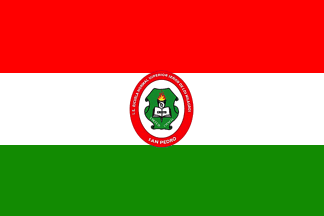 image by Ivan Sache and Tomislav Todorovic, 10 January 2021
image by Ivan Sache and Tomislav Todorovic, 10 January 2021
Escuela Normal Superior Privada para Señoritas Señor de los Milagros was
established in San Pedro de los Milagros (Antioquia) by Decree No. 468 issued on
26 January 1959. Institución Educativa Escuela Normal Superior Señor de los
Milagros was established by Resolution No. 1,500 issued on 20 February 2003.
http://www.normalsm.edu.co
School website
The flag of Escuela Normal Superior Señor de los Milagros
is horizontally divided red-white-green with the school's coat of arms in the
center.
Red is a symbol of love, sacrifice and heroism.
White is a symbol
of purity, rectitude and limpidity.
Green is a symbol of hope and fertility.
http://www.normalsm.edu.co/#!/-escudo-y-bandera
School website
Photo
https://www.facebook.com/normalsm/photos/431746553656395
Ivan Sache,
10 January 2021
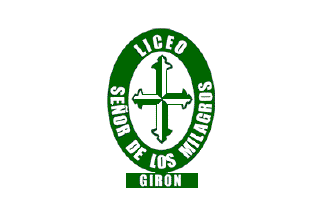 image by Ivan Sache, 20 May 2012
image by Ivan Sache, 20 May 2012
The Liceo Señor de los Milagros, is located in the
Municipality of Girón, Department of
Santander.
Its flag is seen
here (white horizontal flag with the coat of arms in the middle). It can also be seen
here (top right flag)
(Source:
http://simposioliceo-2009.blogspot.com/ )
The Coat of Arms is seen
here and
here.
(Source:
http://aplicaciones.colombiaaprende.edu.co/colegios_privados/content/colegio-liceo-se%C3%B1or-de-los-milagros)
For additional information please go to:
Liceo Señor de Los Milagros
(official website, currently down)
Esteban Rivera, 15 May 2012
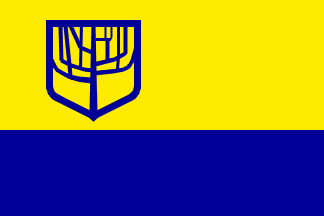 image by Eugene Ipavec, 21 October 2007
image by Eugene Ipavec, 21 October 2007
The flag of the Universidad Sergio Arboleda. You can find the
explanation of the Coat of Arms at <www.usergioarboleda.edu.co>.
The University is located in Bogota..
Source: Official
website.
E.R., 14 October 2007
The arms are canting; "arboleda' means "grove"
(of trees). The website calls it the "tree of wisdom of
Aristotle," so apparently a diagrammatic representation of
the hierarchy of the sciences rather than an actual tree.
Eugene Ipavec, 14 and 21 October 2007
I have not found yet a reference to Aristotle, but René
Descartes (Les principes de la philosophie, 1644; originally
written in Latin as "Principia philosophiae") defined a
"tree of knowledge". My own translation from the French
text:
"Therefore philosophy is like a tree, whose roots are
metaphysics, trunk is physics and branches emerging from the
trunk are all the other sciences, which can be reduced to three
main ones, medicine, mechanics and ethics, I mean here the
highest and most perfect ethics, which, assuming a perfect
knowledge of the other sciences, is the highest degree of wisdom.
Since fruits are cropped neither from the root or the trunk of
the tree built but only from the end of the branches, the main
usefulness of philosophy depends on its parts which cannot be
learned only as the last one."
The Catalan philosopher and mystic Ramon Llull (XIIIth century)
also uses the metaphor of the "tree of sciences", which
has 18 roots, made of the nine divine (absolute) principles,
including wisdom, and of the nine logical (relative) principles.
Ivan Sache, 21 October 2007
"Universidad Sergio Arboleda", located in Bogotá,
is named after Sergio Arboleda (1822-1888). Born in Popayán,
Arboleda studied Law at "Universidad del Cauca", where
he was subsequently appointed Rector. Arboleda dedicated most of
his life to the education of the youth but also contributed to
the political life of Colombia, as a member of the National
Congress, of the Assembly of Cundinamarca and of the Provincial
Chamber; he submitted in 1885 a draft of Constitution to the
National Assembly.
The shield of the university was designed by Dr. Alvaro Gómez
Hurtado, in collaboration with Dr. Ramón Bulla Qunitina, Dean of
the School of Philosophy, Humanities and Education.
The trunk of the tree represents Philosophy. The branches on the
right side of the trunk are Humanities, such as Literature,
Philosophy, Astronomy, Law, Communication...
The branches on the left side of the trunk are Exact Sciences,
such as Mathematics, Finance, Engineering, Economy... The border
of the shield encompasses all knowledge, with the following
caveat emptor: "If first we don't understand God's love, all
knowledge will be difficult, obscure and unuseful".
Source: <www.usergioarboleda.edu.co>.
Ivan Sache, 28 December 2008
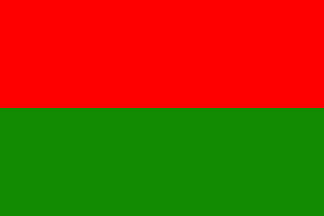 image by Ivan Sache, 9 October 2018
image by Ivan Sache, 9 October 2018
Institución Educativa Sevilla originates in Colegio Profesional Feminino,
established on 16 October 1937 in Sevilla, Vale del Cauca Department., and
renamed in 1943 year Liceo Femenino. Liceo Mixto Sevilla, established on 7
December 1993 by Resolution No. 960, was merged in 2003 with Escuela María
Inmaculada, Jardín Infantil Rafael Pombo, Escuela Heraclio Uribe Uribe, Escuela
Los Fundadores, Escuela Monserrat, Escuela San José, Escuela Pedro Emilio Gil,
Escuela Primitivo Crespo, Escuela John F. Kennedy, Escuela Antonia Santos, and
Santa Mariana de Jesús to form Institución Educativa Sevilla.
http://iesevilla.edu.co - Institute's
website
The flag of the institute is horizontally divided red-green.
http://iesevilla.edu.co/sitio/bandera
- Institute's website
Ivan Sache, 6 March 2017
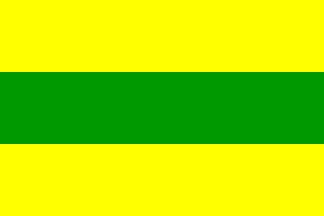 image by Ivan Sache, 29 January 2009
image by Ivan Sache, 29 January 2009
"Institución Educativa 'Silvino
Rodríguez'" was founded in the Municipality of
Tunja, Department of Boyacá, in 1973 (Decree No. 12), through
the merging of "Colegio 'Silvino
Rodríguez'" and "Liceo Departamental Femenino",
founded on 31 August 1963 (Decree No. 726) and in 1964 (Decree
No. 039), respectively.
The institute is named after Silvino Rodríguez, Governor of
Boyacá in the 1920s.
The flag of the institute, as shown graphically and described on
the website
of the institute, is horizontally divided
yellow-green-yellow, the two colours being also used on the
emblem of the institute.
The flag and emblem were designed by Otoniel Jiménez Cuervo and
Alfonso Mariño Camargo. Yellow represents the projection of the
young minds, looking like sun rays, eager to learn and know.
Green represents hope.
Ivan Sache, 29 January 2009